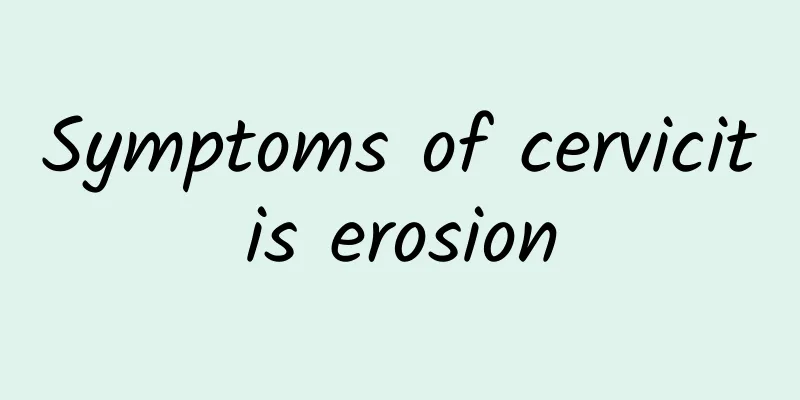What are the symptoms of cervical hypertrophy in women?

|
Women with cervical hypertrophy may experience symptoms such as increased vaginal discharge, abnormal menstruation, and lower abdominal pain. In severe cases, medical attention should be sought promptly. Cervical hypertrophy is usually caused by chronic inflammation, changes in hormone levels, or cervical gland cysts. Treatment options include medication, physical therapy, and surgical intervention. 1. Increased vaginal discharge is one of the common symptoms of cervical hypertrophy. Leucorrhea may be yellow or purulent, with a peculiar smell. This condition is usually associated with chronic cervicitis, and inflammation stimulates the increased secretion of cervical glands. Antibiotics such as metronidazole and azithromycin can be used for treatment, and local medications such as vaginal suppositories, such as clotrimazole suppositories or metronidazole suppositories, can be used at the same time. 2. Menstrual abnormalities are also one of the manifestations of cervical hypertrophy. Patients may experience increased menstrual volume, prolonged menstrual periods, or irregular bleeding. This is related to endometrial vascular hyperplasia caused by cervical hypertrophy. Hormonal drugs such as progesterone and oral contraceptives can be used to regulate the menstrual cycle, and curettage can be performed when necessary. 3. Lower abdominal pain is another symptom of cervical hypertrophy. The pain may persist or occur intermittently, and in severe cases affect daily life. This is related to the compression of surrounding tissues by cervical hypertrophy or inflammatory stimulation. Non-steroidal anti-inflammatory drugs such as ibuprofen and acetaminophen can be used to relieve pain, while physical therapy such as hot compress and infrared irradiation can be performed. 4. Causes of cervical hypertrophy include chronic inflammation, changes in hormone levels, and cervical gland cysts. Chronic inflammation such as cervicitis and vaginitis can cause cervical tissue hyperplasia; changes in hormone levels such as pregnancy and the use of oral contraceptives can cause cervical gland hyperplasia; cervical gland cysts block cervical gland secretions, causing the cervix to increase in size. 5. Treatments for cervical hypertrophy include medication, physical therapy, and surgical intervention. Medication mainly targets inflammation and hormone regulation, such as antibiotics and hormone drugs; physical therapy such as laser, freezing, and microwave can reduce the size of the cervix; surgical interventions such as cervical conization and hysterectomy are suitable for severe cases. Symptoms of cervical hypertrophy in women vary, and treatment methods need to be selected according to the specific cause and symptoms. It is recommended to seek medical attention in a timely manner when relevant symptoms appear, undergo gynecological examinations and cervical cytology examinations, and develop individualized treatment plans after a clear diagnosis. Paying attention to personal hygiene in daily life, avoiding unclean sexual life, and performing regular gynecological examinations can help prevent and detect cervical hypertrophy at an early stage. |
<<: Is Type IV intestinal atresia serious?
>>: How to check pathogens in chronic cervicitis
Recommend
Do you know all this knowledge in the uterus pictures? You may not know this knowledge
Many people do not know much about endometrial th...
How to treat premature ovarian failure with traditional Chinese medicine?
More and more people are experiencing premature o...
How to recuperate after abortion?
After an abortion, the body is weaker and the imm...
Could pelvic effusion be cervical adhesion?
Could pelvic effusion be cervical adhesion? In li...
Experts teach you how to prevent cervical erosion
As a common gynecological disease, more and more ...
How to know if you have intrauterine adhesions
How do I know if I have uterine adhesions? Genera...
Analysis of clinical nursing effect on bacterial vaginosis
Although bacterial vaginosis is not as easy to oc...
What are the symptoms of uterine fibroids? Are uterine fibroids tumors?
Among gynecological diseases, uterine fibroids ar...
What should I do if I find an ovarian cyst during pregnancy? Is there any harm?
Before and after pregnancy, women will undergo so...
Can ectopic pregnancy really be cured?
In life, more and more women suffer from ectopic ...
How is endometrial tuberculosis diagnosed?
Endometrial tuberculosis is a common gynecologica...
What to do if the uterus prolapses and the vaginal wall bulges
Uterine prolapse and vaginal wall prolapse are tw...
Why do uterine fibroids cause lung cancer? Can uterine fibroids cause lung cancer?
Why do uterine fibroids cause lung cancer? This i...
What are the symptoms of cervicitis
Cervicitis may cause abnormal secretions, itching...
Is it better to take medicine or infusion for pelvic inflammatory disease?
Is it better to take medicine or intravenous drip...









